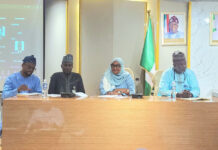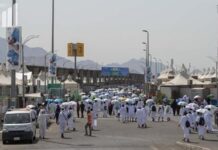By Femi Abbas
MONOLOGUE
It is rather ironic that today’s world takes Muslims for the mirror through which Islam is perceived when the opposite should actually be the case. Just as it is wrong to measure knowledge, in an institution of learning, by the quantity or quality of the architectural structures available therein, so it is wrong to use Muslims as the mirror through which Islam can be seen or as a scale with which to weigh the value of that divine religion. On the contrary, Islam is the mirror through which Muslims are supposed to be seen nakedly and avowedly. Islam is also the scale with which Muslims are supposed to be weighed in value and in virtue.
EMERGENCE OF ISLAM
When the sacred religion called Islam emerged through the last Messenger of Allah, Muhammad the son of Abdullah over 1,400 years ago, it was with certain fundamental norms that were meant to guide humanity towards all virtuous acts in life. One of the most formidable pillars of that divine religion is fasting in the month of Ramadan. With it, all genuine Muslims are supposed to fortress themselves against any satanic recklessness that could turn them into wild beasts.
QURANIC REVELATION
Now, we are in the sacred lunar month in which the revelation of the Qur’an began in 610 C.E. It was in this divine month that the last divine constitution with which to liberate mankind from the shackles of Satan was revealed. The real spiritual essence of Ramadan is to show mankind the right path to Paradise through a phenomenal transit called the world.
This allegorical month is a special school in which Prophet Muhammad (SAW) was both the pioneer student and the pioneer teacher at the same time. All other students who passed through this school or are still passing through it are heirs to those forerunners in the name of shepherds.
DUTIES OF SHEPHERDS
The duty of the heirs, to the above mentioned forerunners, is to serve as shepherds for the wandering flocks of the universe. It is this duty that confirms man as Allah’s vicegerent on earth.
Anyone who is in a position to serve as a shepherd but does otherwise has surely contravened the rules of his or her Creator.
Ironically, most of those we perceive as shepherds in our society are worse than the presumed‘lost sheep’ that they are supposed to guide aright. For those who know and appreciate it, the opportunity of rebirth provided by the sacred month called Ramadan has no duplicate. It is like a ‘once in a while’ train which every commuter should endeavour not to miss. Missing it is like missing a lifelong destiny of fortune. But will the recalcitrant ones among the so-called Alfas heed this warning?
A SEASON OF JAMBOREE
With the arrival of Ramadan in the world last year, just like in the previous years, a scene of jamboree took over most radio and television stations, especially in the Southwest of Nigeria. Many pseudo- Alfas who had been redundant before Ramadan quickly dusted their gowns and turbans for the purpose of sharing in the annual largess which they believed that the sacred month had brought for them. Such pseudo-Alfas who might have taken advantage of some ignorant ‘money bags’ in the society by asking them to sponsor Ramadan preaching on radio and television stations swarmed the airwaves like bees in a hive. With little or no knowledge at all, those pretenders posed like scholars and dished out rubbish by arrogating to themselves the knowledge which they evidently did not possess. Their displayed symbols of scholarship included big gowns, big turbans, untidy beards and irrelevant long rosaries.
CLERICS OR CHARLATANS
One of the characteristics of charlatans, who pose as clerics, is to spend the first 10 minutes or thereabout, in singing the praises of their sponsors and in chanting some irrelevant slogans even as they relay some fabricated, primordial tales with neither genuine roots nor any relevant bearing with Islam. Their trade in stock is to seek fraudulent recognition for themselves by showing their faces on television stations or by airing their voices on radio stations just to be accorded the status of Alfas. Such are people who have no thorough Islamic knowledge and do not see the need for seeking it. Rather than guiding the multitudes of uninformed Muslims aright, which is the primary duty of qualified, genuine Muslim clerics, they further mislead them. Of course, no one can give what he does not have.
To this category of so-called Alfas, all that matters is the money they want to make through their deceptive appearances as well as the cheap fame they want to gain as a boost to their fraudulent ego.
That is why such people resort to public verbal attacks and counter attacks on one another with little consideration for decorum which Islam recommends affirmatively.
And, through such shameful deeds, the charlatans invariably create an impression that Ramadan is an annual festive booty celebrated with fanfare in a jamboree.
FAULTY RECITATION
The most embarrassing aspect of these people’s action is not only the faulty recitation of the Qur’anic Verses but also the shameless misinterpretatiwhich they give to those Verses. This, alone, is not just an abuse of Ramadan but also a flagrant abuse of the Qur’an. That is how the charlatans turn the sacred month into a gross abuse of Islamic religion. What those charlatans do not understand is that the Qur’an, in its original form, is not just any book that any charlatan can dust up once in a year as a means of fetching money for selves but a Sacred Book on which account will be given.
UNNECESSARY CONTROVERSY
Meanwhile, there is a raging controversy among Muslim scholars over the first and last revelations in the Qur’an. Much as this controversy is unwarranted, it may be necessary to clear the coast here (without laying claim to any authority) if only for the purpose of authenticating history.
It is almost a consensus that the first revealed chapter in the Qur’an is Suratul ‘Alaq (Chapter of the Clot). But the very first Qur’anic words that reached Prophet Muhammad (SAW) in form of revelation through Angel Jibril was ‘BASMALAH’ (ie Bismillahir-Rahmanir-Rahim) meaning:
In the name of Allah, the Compassionate, the Merciful,r which precedes every chapter in the Qur’an, except one (Suratut-Tawbah).
As a Messenger of Allah to another Messenger of Allah, Angel Jubril couldn’t have commanded Prophet Muhammad (SAW) to read anything without doing so in the name of Allah who sent him with the message.
Thus, Suratul ‘Alaq, as preceded by ‘BASMALAH’, could only have been the first revealed chapter but not the first revelation. And that is logical.
As for the last revelation in the Qur’an, majority of Nigerian Muslim scholars believe that it is chapter 5, verse 3 of the Qur’an which says: “Today, I have perfected your religion for you and completed my favour on you. And, I am pleased with Islam for you as religion”.
That verse of the Qur’an that was revealed to Prophet Muhammad (SAW) at ‘Arafah while performing his only and farewell Hajj, couldn’t have been the last revelation. It was revealed about 81 days before the demise of the Prophet (SAW). And there was another revelation, thereafter, which came about nine days before the Prophet fell terminally sick. This can be found in Qur’an 2: 281 thus: “And fear the day when you shall all return to Allah; the day when every soul shall be requited according to its destiny and none shall be wronged”.
HOW NOT TO RECITE SURATUL FATIHAH
The issue of ‘Basmalah’ mentioned above is a reminder of the status of Suratul Fatihah and how not to recite it.
Suratul Fatihah is not just one of the 114 chapters of the Qur’an, it is also the very first chaper of of that Sacred Book in order of Prophetic arrangement. This Surah was named the opening chapter because of the indispensable role it plays, not only in the observance of Salat, but also in the faith of a Muslim.
Unlike all other chapters of the Sacred Book, Suratl Fatihah was revealed twice to Prophet Muhammad (SAW) within the 22 years that the whole Qur’an was revealed. Revealing the chapter twice (once in Makkah and once in Madinah) was a divine emphasis on the specialty of its importance in the practice of Islam. This is the Surah that Prophet Muhammad (SAW) codenamed ‘Mother of the Glorious Book’ (ie: the Qur’an) because of its strategic position in the Sacred Book which makes it the summary of the whole Qur’an. It is the only chapter in the Qur’an that sustains the authenticity of Salat and confirms its acceptability to the Almighty Allah. Any Salat without recitation of Suratul Fatihah in full is null and void.
JURISPRUDENTIAL RULE OF BASMALAH
The word Basmalah is, connotatively, the acronym for ‘Bismillahir-Rahmanir-Rahim’ which is the first of the seven verses of Suratul Fatihah.
Suratul Fatihah is the only chapter of the Qur’an that has ‘Basmalah’ (Bismillahir-Rahmanir-Rahim) as one and the first of its verses. This means that recitation of Basmalah as part of that chapter is as compulsory on Salat as the recitation of the whole Chapter itself. If the rule of Islamic jurisprudence (Fiqh) demands that the recitation should be aloud, as in the case of Salatus-Subh and Maghrib and Isha’i, the recitation of Basmalah must also be aloud. If, on the other hand, the recitation should be silent as in the case of Salatud-Dhuhr and ‘Asr, the recitation of Basmalah too, must be silent. There should be no half way about it.
To all other chapters of the Qur’an, Basmalah is not classified as a verse. It is just a prefix that an observer of Salat may decide to read or not to read after Suratul Fatihah. That Suratul Fatihah contains seven verses and the very first of those verses is Basmalah cannot be contested or taken for granted. Only Allah knows why He revealed it as such and He alone has the final authority on the rules of its recitation. Suratul Fatihah itself is divinely classified into three segments.
The first Segment consists of the first three verses that emblazon and glorify Allah. The second segment consists of two verses by which an observer of Salat or reciter of the Surah, makes two fundamental promises to Allah. One of those two promises is to worship Him (Allah) alone (without associating anything with Him) and the other is to seek only His divine (Allah’s) help and not that of any other entity (Iyyaka na‘budu wa iyyaka nasta‘in).
The third segment of that chapter contains prayer with which to seek Allah’s divine guidance towards the right path as toed by the previous rightly guided people and not the path of those who, by going astray, have incurred the wrath of Allah.
THE MESSAGE AND THE MESSENGER
Ramadan is a month of correction of errors and that of affirmation of right. On most occasions, when religion becomes an issue, the message is often weightier than the messenger.
Today, most Imams, scholars and individual Muslims do recite Suratul Fatihah, while on Salat, to the exclusion of Basmalah which is the very first verse of that obligatory chapter. This means that in their own wisdom, that Surah should contain six verses rather than the seven verses that Allah revealed to Prophet Muhammad (SAW).
IMPLICATION
The implication of this is that by refusing to recite Basmalah statutorily as part of Suratul Fatihah, the reciter has either beheaded that chapter against the rule of its revelation or he/she has edited the contents of Allah’s revelation to mankind. But, if we may ask a question here, who is that mortal being that is wiser than the immortal Supreme Entity that revealed Suratul Fatihah on purpose?
This is a weighty question that requires a straight forward answer without any rationalized argument as a justification for deviation from Allah’s own Sunnah. The Almighty Allah Who revealed Suratul Fatihah twice with seven verses, including Basmalah, had a reason for doing so. And, no mortal being can claim any wisdom as reason for reducing the seven verses of that chapter to six on the basis of mere rationalization. Islam is such a dynamic religion that cannot be reduced to the level of dogmatism by which some other religions are characterized.In other words, Islam cannot be turned into a religion in which the clerics are considered more important than the revealed words of God. If Allah had wanted the recitation of Basmalah on Salat to be a matter of choice, He would have separated it from Suraul Fatihat as He did with other chapters in the Qur’an. Therefore, whoever must recite Suratul Fatihat on Salat, must recite it completely without removing a verse from it. Thus, in order not to lead the followers astray, let presumed leaders of Islam do the right thing as prescribed by Islamic jurisprudence. Ramadan Karim!
CLARIFICATION
The earlier verse was an accentuation of Hajj as the last pillar of Islam. And that was why it came on Arafah Day. The latter is a reminder of man’s final destination and the account of his worldly activities. These and many more are what readers of the Qur’an should seek to know inside out in this sacred month. But the big question is this: who will teach them when the supposed teachers have sold out to money and ignorance? To Muslims who are conscious of their spiritual affinity and retain their conscience for the day they will meet their Creator and account for their deeds on earth ‘The Message’ column says RAMADAN KARIM!

























